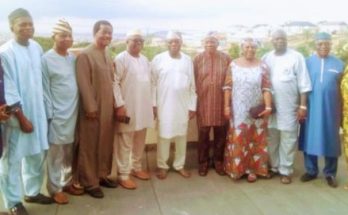Ahead of the 2023 general elections, terrorists Intensify Plot to destabilize Nigeria
BY ANAYOCHUKWU AGBO
President Muhammadu Buhari presided over an emergency meeting of the National Security Council, NSC, on Friday in the wake of the Kuje Correctional Centre break and worsening insecurity across the Country. In attendance were: Vice-President Yemi Osinbajo; National Security Adviser (NSA), Major Gen. Babagana Monguno (rtd); the Chief of Defence Staff, Gen. Lucky Irabor; the three service chiefs and the Inspector General of Police (IG), Alkali Baba.
After the meeting, Minister of Police Affairs, Mohammed Dingyadi, told State House correspondents that the terrorists succeeded because they had superior weapons and more men than the security men. “You see this kind of thing; they happen. And I want to assure you that all those who are supposed to play a role in ensuring that the attack is neutralized did the best that they could to neutralize it. I think what helped them (terrorists) was the number of people they came with and the superior weapons that they came with. And because nobody anticipated it, the few people who were there guarding the place could not withstand the number that they came with. I think that was what happened.”
He said without any evidence that there may have been causalities on the side of the terrorists. “Some of them have been killed. But I can’t give you the number, and I don’t know the number because like they used to do, whenever one of them is killed, they take the corpse away, and you cannot know the number of people who have been killed. But definitely, quite a number of them were killed, and many of them ran away with bullet wounds.”
An embarrassed Buhari had visited the breached Kuje Medium Security Custodial Centre on Wednesday, July 6, a few hours after daring terrorists invaded the Correctional Centre and freed their 64 colleagues from custody. A total of 879 inmates were freed, out of which 443 have been recaptured while 437 are still at large.

The Islamic State in West Africa Province, ISWAP, in a video released on Wednesday night, claimed responsibility for the attack. The Police on Friday declared 69 escapees, most of whom are Boko Haram terrorists, wanted in connection with the incident.
“I am disappointed with the intelligence system,” said the President after inspecting the breach. “How can terrorists organise, have weapons, attack a security installation and get away with it? How did the defence at the prison fail to prevent the attack? How many inmates were in the facility? How many of them can you account for? How many personnel did you have on duty? How many of them were armed? Were there guards on the watchtower? What did they do? Does the CCTV work?”
These are technical questions from a very disturbed professional. And he demanded answers in a comprehensive report to him. He was briefed by the Permanent Secretary at the Ministry of Interior, Shuaib Belgore; and the Controller General of Nigerian Correctional Service, Haliru Nababa. He was accompanied by the Secretary to the Government of the Federation, Boss Mustapha, and his Chief of Staff, Professor Ibrahim Gambari,
According to NCoS, The terrorists set the records office on fire and launched attacks on all cells in which Boko Haram terrorists were held. However, the records were not lost because they had been backed up.

The numbers weighed heavily in favour of the terrorists with only three confirmed causalities on their side and they achieved their target of freeing all 64 hardened terrorists in custody. During the gun battle, a personnel of the NSCDC was killed; while three officers of the Nigerian Correctional Service also sustained bullet injuries. Four inmates were killed and 16 others sustained various degrees of injuries
In the wake of recent prison breaks in the country, a new reinforced defence protocol was developed for the correctional centres. This involved collaboration with other security agencies. The Nigeria Correctional Service, NCoS confirmed that “at the time of the attack, personnel from the military, Nigeria Security and Civil Defence Corps (NSCDC), Nigeria Immigration Service, Nigeria Police Force, and State Security Service were on ground to support men of the Armed Squad unit of the Nigerian Correctional Service.”
Yet security gave way to conspiracy, as William Shakespeare says.
The Correctional Service immediately deployed the e-Corrections Information Management System (e-CIMS) to track all fleeing inmates and possibly return them to custody. Haliru Nababa, controller-general of Corrections, assured the public that the biometrics of all the inmates are intact and will be used to track them wherever they hide.
The Custodial Centres of the Nigerian Correctional Service have a combined carrying capacity of 58,278 as against the population of over 75, 000 inmates, an over-population of 16,722 inmates. The NCoS maintains 244 facilities nationwide, including 20 farm centres, 10 cottage industries, one open camp, and four Borstal training institutions.
Part of the reforms recently adopted by the Service was scaling up the capacity of the Armed Squad and Intelligence personnel in the use of high-calibre weaponry and intelligence gathering.
Connection with Abuja-Kaduna Train Kidnap
Tukur Mamu, media aide to Sheikh Ahmad Gumi, a Kaduna-based Islamic cleric, said the security agencies ignored credible intelligence that would have forestalled the Kuje prison break.
In a statement on Thursday, he alleged he shared intelligence with the authorities about the Kuje Prison attack but they failed to act. He further claimed the Kuje Prison attack was carried out by Ansaru terrorists, said to be the same group that attacked and abducted passengers of the Abuja- Kaduna bound train on March 28.
“On the tendency and threat to attack targets and other facilities of interest like the Kuje Correctional Centre I have shared that intelligence with the security agencies and the committee that was constituted by CDS Gen. Lucky Irabor. I can confirm without doubt that the Kuje Correctional Centre attack was executed and coordinated by the same group that attacked the Abuja-Kaduna bound train because they gave indications of imminent attacks to that effect which I shared. For the records, they requested for the release of 51 of their members. But through the power of dialogue and engagement, I was able to singlehandedly scale that number to only 10 and communicated with audio backing the development to the relevant authorities.
“There was an unnecessary delay on giving them even precise feedback by the government and now they have not only succeeded in carrying out another successful attack that indicts the nature of our intelligence and capacity to respond promptly but has also succeeded in releasing dozens of their members which would have been averted if the action has been taken to give them only 10 and secure the release of the train victims.

“In all this risky, painful and frustrating engagement which government is yet to acknowledge and appreciate, I have more than 100 documented audios that I shared with the relevant authorities. For the purpose of this important press release and to authenticate my claims, I will also share four of the latest audios.”
The same day a band of terrorists ambushed the convoy of cars carrying the Advance Team of security guards, protocol and media officers ahead of President Muhammadu Buhari’s trip to Daura for Sallah near Dutsinma, injuring two.
A day earlier, terrorists ambushed Assistant Commissioner of Police Aminu Umar, Area Commander, Dutsinma and his team, while on clearance operation of recalcitrant bandits/terrorists, in Zakka forest, Safana LGA of Katsina state. Umar was killed in the encounter.
The Dangerous Implications
The breach of the Kuje Custodial Centre and the Katsina incidents have grave implications for national security, according to security experts.
Afakriya Aduwa Gadzama, chairman of the National Institute for Security Studies and former director general of the Department of State Security Service, (DSS) under President Umaru Yar’Adua from August 2007 to September 2010, says that it means that nowhere is safe in Nigeria:
“Insecurity arising from activities of Boko Haram and their ISWAP affiliates and armed bandits currently pose unprecedented threats to counter-insurgency efforts. There are fears that unless something is done fast, the successes of the last couple of years would be lost. Unfortunately, some areas witnessing the incursions are those most devastated before the terrorist groups were dislodged. Evidently, the activities of armed bandits, terrorists and sundry criminal groups have wreaked unimaginable havoc on socio-economic activities in many states and communities. Continuous attacks by the Boko Haram and ISWAP are currently the most devastating menace that have aggravated the plight of most communities in Borno, Katsina, Kaduna and Zamfara States which have become very dangerous areas for even official business, as well as gateway states to southern parts of the country.”
He said it has been consistently pointed out by some experienced military strategists and intelligence officers that the strategy of just dislodging the terrorists and armed bandits is fraught with the dangers of their eventual regrouping. “This is what has happened in the war against the Boko Haram in the North East. Many of the insurgents were simply dispersed and therefore had the opportunity of regrouping with deadlier groups such as ISWAP. Also, the persistence of conditions that promoted their emergence continues to drive their resurgence. As previously pointed out, the Boko Haram/ISWAP alliance has survived this long because of the lack of will of some stakeholders and lack of appropriate fighting equipment. Almost all the security forces are short of well-trained personnel which resulted in overstretching them. The failure to flush out their cohorts is another major catalyst for the resurfacing of the Boko Haram/ISWAP attacks currently being witnessed in the country.”
He argues that “Many isolated and ungoverned areas especially forests in remote parts of the country provide ideal cover for the terrorists to hibernate. Security experts believe if the fight against ISWAP and terrorism is to succeed all forests and remote places must be thoroughly cleared.
“There are indications terrorism in the country will worsen in the coming months with the incursion of ISWAP. Notwithstanding the plans of those behind the insurgency, the menace should not go beyond the Muhammadu Buhari government. This is the reason why allowing the ISWAP to entrench itself will complicate the security challenges in the country. Obviously, the incursion of ISWAP will roll back the achievements of President Muhammadu Buhari’s government, especially the war against the terrorists’ plans to take over parts of the country. This definitely is the time to stop the insurgents from executing their dastardly plans, once and for all.
“In my considered view, insecurity especially as masterminded by ISWAP could get out of hand at the expiration of the Buhari Government if no drastic steps are taken now. Political office holders at all levels must therefore have the will to fight and overcome all the security challenges honestly before the exit of the present government.
He advises that “to achieve the desired security that will allow for orderly handover, the limitations of the security forces must be holistically remedied. In particular, re-organizing the security forces should be accorded priority. In this regard, competence, loyalty and thorough re-examination should be the yardstick for appointments to higher service positions. At a time like this, only those who can speak truth to power should be appointed to positions of leadership in all the security forces. Those to be appointed should also have the knowledge, capacity and competence. The Security Forces should be strengthened and re-equipped. Above all, the country must also strive to have all-inclusive governance henceforth where there is fairness, equity and justice. All these should be seen as some of the critical requirements for orderly political transition and peace in the country thereafter.”
Ahead of the 2023 general elections, security experts warn that ISWAP/Boko Haram are desperate to achieve certain operational targets before Buhari leaves office. It is felt that they want to maximise operational gains and move to the next phase of destabilizing and taking over Nigeria.
If the Buhari administration fails to rein in the rampaging terrorists, they may overpower the next president before he settles down to business.




